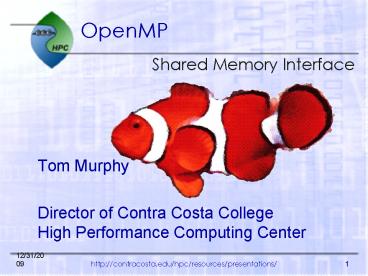OpenMP - PowerPoint PPT Presentation
1 / 19
Title:
OpenMP
Description:
#pragma omp for private(wl) Create variable 'deltaT' in scalar part. double deltaT; ... Create a temporary array. make it bigger and/or more threads. When do ... – PowerPoint PPT presentation
Number of Views:27
Avg rating:3.0/5.0
Title: OpenMP
1
OpenMP
Shared Memory Interface
- Tom Murphy
- Director of Contra Costa CollegeHigh Performance
Computing Center
2
Preliminaries
What is OpenMP?
- Enables shared memory parallelism
- Consists of
- Compiler directives
- Functions
- Environment variables
- Requires a supportive compiler
- C, C, and Fortran
- Are the languages of OpenMP
- We will be using C
3
Preliminaries
which version are we using?
- OpenMP 2.5
- Gcc 4.2 (May 2007) supports OpenMP 2.5
- When Gcc 4.4 releases it will support 3.0
4
Preliminaries
How do we use it?
- To setup to run the compiler
- alias ompcc'icc -openmp -openmp-report2
- You can now use ompcc
- In place of icc or gcc
5
Sequential Hello world
the code of hello.c
- include ltstdio.hgt
- int main ()
- //pragma omp parallel
- //
- printf("Hello World!\n")
- //
- return 0
6
Sequential Hello world
starting at the beginning is interesting
- icc hello.c
- ./a.out
- No surprises
- ompcc hello.c
- What do you expect?
- Uncomment comments expecting?
- icc hello.c
- ompcc hello.c
7
Simplest OpenMP example?
the code of for.c
- include ltomp.hgt
- include ltstdio.hgt
- int main ()
- int i
- pragma omp parallel for
- for(i0 ilt10 i)
- printf("id\n", i)
- return 0
8
Simplest OpenMP example?
parallelizing a for loop
- Run the command ompcc for.c
- Run the command icc for.c
- _OPENMP should be defined
- Split printf into two lines
- printf("i)
- printf(d\n", i)
9
Sharing is not always good
the code of ranksize.c
- include ltomp.hgt
- include ltstdio.hgt
- define WORKLOAD 1
- int main ()
- int rank, size, i
- pragma omp parallel
- rank omp_get_thread_num()
- for(i1 iltWORKLOAD i)
- printf("Hello World from thread d\n", rank)
- if ( rank 0 )
- size omp_get_num_threads()
- printf("There are d threads\n",size)
- return 0
10
Sharing is not always good
lots of key things happen now
- Run icc ranksize.c
- Can _OpenMP still help?
- ompcc ranksize.c
- Run it several times
- Change WORKLOAD to be 1000000
- We need a separate copy of rank in each thread
- Add private(rank) clause to pragma parallel
- Why didnt the variable I in for.c fail us?
- Are we done?
11
How to measure success?
Lower wallclock or efficient CPU use?
- Wall clock is easy to measure
- Its what the user cares about
- CPU use is harder to measure
- Its what the data center cares about
- Profiling tools exist, and are important
- Close enough is also success
- Human time is also valuable
12
Its all about timing
the code of timing.c
- include ltomp.hgt
- include ltstdio.hgt
- define WORKLOAD 1
- define MAXDIM 10
- int main ()
- int i, wl
- double aMAXDIM, bMAXDIM, cMAXDIM
- for(i0iltMAXDIMi) aibicii
- pragma omp parallel for private(wl)
- for(i0iltMAXDIMi)
- for(wl0wlltWORKLOADwl) ci ai/bi
- for(i0iltMAXDIMi) printf("d\tf\n", i,
ci) - return 0
13
Its all about timing
can see effect of parallelization overhead
- time ./a.out gives overall wallclock time
- double omp_get_wtime(void)
- Gives more fine grained control
- Requires some code changes to use it
- Split parallel for into two pragmas
- Create variable deltaT in scalar part
- Calculate deltaT at top and bottom
- Do a reduction on deltaT
14
Its all about timing
little more detail on the changes
- Split parallel for into two pragmas
- pragma omp parallel
- pragma omp for private(wl)
- Create variable deltaT in scalar part
- double deltaT
- Calculate deltaT at top and bottom
- deltaT omp_get_wtime()
- deltaT omp_get_wtime() - deltaT
- Do a reduction on deltaT (first pragma)
- pragma omp parallel reduction(deltaT)
15
All about reductions
lots of possibilities
- Specify operator and a list of variables
- Can have more than one clause, as needed
- Private copy made, initialized relative to
operator - Operator initial value
- 0
- - 0
- 1
- 0
- 0
- 1
- 0
16
Simplest revisited
exploring for.c and timing changes
- Printf in two pieces didnt print together
- This is critical - add the right pragma
- pragma omp critical (printTest)
- printf("i)
- printf("d\n", i)
17
Simplest revisited
but they are still out of order
- Lets force iterations to be in sequence
- Add ordered as clause on parallel for
- Use timing calls to understand
- before and after costs of being ordered
18
timing loop revisited
we can control scheduling
- Four possible for clauses
- schedule(static, iterations/numthreads)
- schedule(dynamic, 1)
- schedule(guided, 1)
- schedule(runtime)
- OMP_SCHEDULE envar
- OpenMP 3.0 gives better runtime control
- Modify timing.c and time differences
- Make work loop go to iWORKLOAD
- Make work loop go to (MAXDIM-I)WORKLOAD
19
Additional experiments
to run in your copious spare time
- OMP_NUM_THREADS
- Allows you to set the number of threads to use
- void omp_set_num_threads(integer)
- Integer omp_get_num_threads()
- Create a temporary array
- make it bigger and/or more threads
- When do things destabilize?
- How can you know?
- OMP_STACKSIZE comes with OpenMP 3.0































